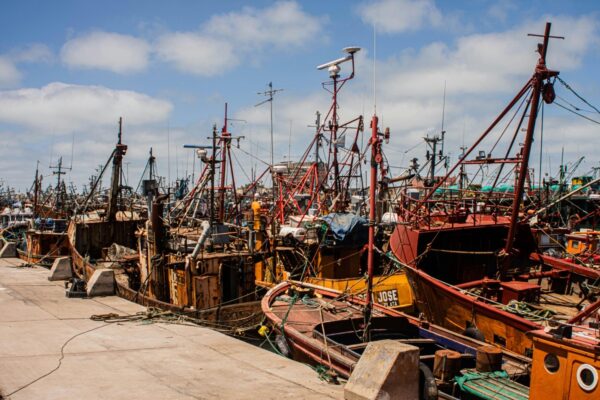A group of leading ocean experts say the prevailing definition of ‘sustainable fishing’ is dangerously flawed and have set out 11 ‘golden rules’ to redefine sustainable fishing.
In a paper published in Ocean Sustainability, researchers have called on companies, governments, and legislators to implement these actions to end the ongoing destruction of oceans caused by fishing and ensure the renewal of abundant fish populations to feed future generations. The original publication has now been complemented by a report titled “11 Golden Rules for Truly Social-Ecological Fisheries – a redefinition of the concept of sustainability towards a brighter future for the ocean and communities”.
A week before Brussels’ Ocean Week, and a few months before the UN Ocean Conference in Nice the authors drastically downgraded their assessment of the ocean’s health status.
11 recommendations
Recommendation actions fall into two categories i) regenerate the ocean’s health and ii) put humans before profits, and include limiting the size of boats and equipment, incorporating ecosystem protection into fisheries management and ending “harmful subsidies” to fisheries.
Regenerating the ocean’s health:
- Fish less and manage fisheries for lower impact
- Rule out gears and fisheries that generate significant collateral damage
- Set limits on the size of boats and gears
- Source only from fisheries with good governance, sustainable stocks, and sufficient data to assure sustainability
- Pro-actively incorporate ecosystem protection into fisheries management
- Place the most vulnerable species and areas off limits
Putting humans before profits:
- End fisheries that abuse human rights, including those that threaten food security and livelihoods of people in the places they fish
- Create fisheries management systems that fairly and transparently distribute access and benefits
- Apply good practices wherever fishing companies operate
- End the flow of harmful subsidies to fisheries
- Apply zero-tolerance to companies that engage in illegal fishing
Professor Paul Kemp from the University of Southampton, a coauthor on the paper, said: “This initiative brought together a diverse group of experts, including those from fisheries science, social sciences, economics and conservation.
“By doing so we were able to develop a roadmap to move away from the traditional view of fisheries that tends to focus on the social and economic context of those who utilise them.
“Sustainability, however, requires the integration of the social, economic and environmental domains. This paper provides a manifesto that will help secure our fisheries for sustainable exploitation by future generations.”
The scientists call on policymakers, retailers, fishers and industry leaders to embrace this new vision and commit to its implementation.
A flawed definition
The authors of the paper decided to work together over the course of years based on a shared consensus: the prevailing definition of “sustainable fishing” is dangerously flawed and leads to the ongoing depletion of marine species, the destruction of natural habitats and carbon sinks, as well as the disappearance of artisanal fishing communities around the world.
“The current concept of ‘sustainable fishing’, adopted by governments and private actors since the post-war period is scientifically obsolete,” said lead author Professor Callum Roberts, from the University of Exeter and chief scientist of the Convex Seascape Survey.
“It relies on a simplistic, productivist theory which assumes that as long as global catch volumes remain below a set limit, anyone can fish just about anything, anywhere, with any method.”
Professor Roberts added: “We must view fishing as a privilege rather than a right.
“Marine life is a public good that should both benefit society and nature, not be the object of a resource race driven by private gains.”
Ambitious proposals
With many of the proposed actions rooted in proven successful practices, the authors state the proposals are ambitious yet realistic.
The scientists urge policymakers, retailers, and fisheries managers to acknowledge the failures of current fishing practices and prioritize adopting the proposed golden rules.
They say supermarkets, which are responsible for nearly two-thirds of European seafood sales, play a pivotal role in driving this transition as they can influence fishing practices through their sourcing policies, scrutinise “sustainability” labels, and respond to growing consumer concerns about the hidden impacts of their food.
“We are witnessing a growing disconnect between the widespread availability of supposedly sustainable fish products, the collapse of ocean ecosystems and the frequency of reported human rights abuses. Supermarkets must stop misleading consumers” warned Pauline Bricault, BLOOM’s markets campaign lead, which helped to coordinate the paper.
“Both the IPCC and IPBES have set 2030 as a deadline for critical changes. Industry stakeholders have no more excuses, they must act now.”
Despite widespread acceptance by industry and consumers, current sustainability standards overlook pressing issues like biodiversity loss and climate change, while supporting high-capital industrial practices that primarily benefit the Global North.
These practices harm ecosystems, threaten artisanal fishing and food security, and jeopardize jobs, while undermining humans’ universal right to a clean, healthy, and sustainable ocean.
